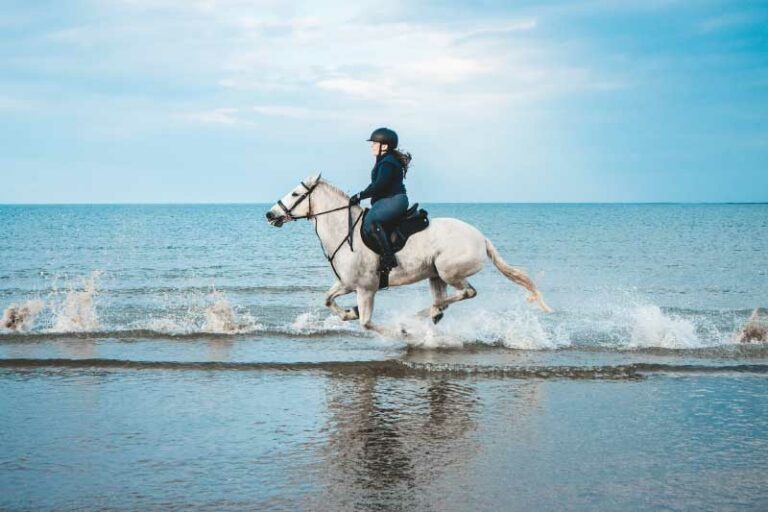Horse riding is a popular activity amongst people of all ages. It not only provides an enjoyable and challenging workout but also comes with numerous physical and mental health benefits. Let’s check what outcomes you can get if you decide to take up horse riding.
Physical Health Benefits of Riding a Horse
One of the major benefits horse riding brings is improved posture. When sitting on a horse’s back, riders must keep their core engaged and maintain good body alignment as they move in harmony with their horse’s gaits. This encourages riders to employ the correct posture. This leads to better breathing habits, more balanced muscle development, and improved flexibility throughout the body.
Another key benefit of horse riding is its ability to strengthen the bond between rider and horse. As horseback riders learn how to control their horse’s movements through subtle cues, they build trust with their horse while forming a strong bond. This connection between horse and rider is mutually beneficial, resulting in improved performance when riding as well as more secure horse handling when on the ground.
Horseback riding also helps riders develop problem-solving skills and critical thinking abilities. Riders make decisions in order to navigate around a course. They must think ahead to solve any potential problems or obstacles that may arise. Horseback riders get to practice making quick decisions. They must learn how to be decisive when it comes to issues such as footing, line of approach, and gate choice. This practice can carry over into other aspects of life outside of horse riding too. It allows horseback riders to gain valuable experience in creative problem-solving.
Riding a horse can provide an ace way to team up with your horse. As horses and riders become more familiar with each other, they will become increasingly coordinated during the ride. This connection can be incredibly rewarding for both as it creates understanding, allowing them to work in unison. Horseback riders must also learn how to communicate clearly and effectively with their animals in order to get the paramount performance out of them.
Such an activity promotes staying physically fit while having fun at the same time. Riding helps build strength and agility while improving flexibility and balance. It can be used for both recreational purposes or competitive sports such as horse racing, cross-country jumping, dressage, polo, and showjumping. Experienced riders can also use horseback riding for endurance activities like long-distance trail rides or competing in horse shows.
Mental Health Benefits of Riding a Horse
In addition to its physical and emotional benefits, horseback riding can also help boost mental health. While learning how to ride a horse, participants must focus on the horse’s movements as well as their own and create a connection between them for successful communication. This concentration helps increase self-awareness, self-esteem, and confidence. Along with this comes improved patience and better decision-making from having to carefully consider each step taken while horseback riding.
Riding an equine requires participants to take responsibility for the horse’s safety by always being aware of their surroundings. This helps build up responsible behavior that can be applied in other aspects of life. The sense of freedom associated with horseback riding often leads to reduced levels of stress, anxiety, and depression.
Bonding with a horse can also be beneficial in the healing process. Horseback riding requires learning to trust and understanding the horse’s personality, as well as developing an emotional connection. Horse-related activities have been found to reduce stress levels, decrease anxiety, improve self-confidence, and increase cognitive problem-solving skills.

What Is Hippotherapy?
Hippotherapy is a form of horse-assisted therapy that involves riding a horse, either in the saddle or on horseback. It’s used to improve motor, sensory, and psychological functions. Hippotherapy can help individuals with physical disabilities gain control over movement. It’s done by enhancing their postural reactions and improving balance through horseback riding. This type of therapy also helps people learn how to relax muscles while riding the horse which can lead to improved posture and coordination.
Horseback riding therapy has been found to have positive effects on persons with autism, attention deficit disorder (ADD), cerebral palsy, posttraumatic stress disorder (PTSD), and Down syndrome. Riding a horse can help these patients develop coordination and balance skills, improve communication skills, and gain confidence Additionally, horse-assisted interventions are increasingly being used in cognitive behavior therapies for addiction treatment. This is due to the calming effect horseback riding has on participants.
Can Kids Ride a Horse?
Absolutely! Horseback riding is a top-notch activity for children to explore. It helps develop gross motor skills, such as balance and coordination. As well as fine motor skills like dexterity and hand-eye coordination.
In addition, riding a horse encourages problem-solving and critical thinking by introducing participants to new obstacles. Children can also form strong emotional bonds with their horses through the process of horsemanship. This in turn helps them develop empathy, leadership qualities, and perseverance.
Safety Tips for Riding Children to Follow
It is important for both horse and young rider to be aware of the proper safety protocols when horseback riding. All kids should wear a helmet, regardless of age or experience level. They should also dress appropriately in sturdy boots and long pants, as well as gloves and a close-fitting jacket if needed. The horse’s tack should be checked before each ride to ensure it is secure and properly fitted. A parent or experienced instructor should always supervise horseback riding sessions involving children.
Is It Safe for Seniors to Ride a Horse?
Yes, horse riding can be a safe and enjoyable activity for aging people as long as they have no underlying medical conditions. Riding a horse is considered an aerobic exercise that can improve overall fitness levels, balance, and coordination. It’s important to take into consideration the horse’s gait when choosing a horse for senior riders. A horse with a slow, relaxed gait will provide a more comfortable ride. It will reduce the risk of injury from falls or kicks. Additionally, avoid activities like jumping and galloping if you’re an older rider.
Creating a Strong Bond between a Horse and a Human
The horse and human bond is a unique one, with horse riders often developing a strong emotional attachment to their companion. This connection can be advantageous in many aspects:
Confidence-Building
Horse riding encourages the development of trust between horse and rider, which can lead to increased self-confidence. With horse riding, there’s a sense of accomplishment when mastering new skills. As well as the feeling of independence that can come from understanding a horse’s needs and reacting accordingly.
Stress Relief
The rhythmic motion associated with horse riding can produce calming effects on the rider. This creates a solid opportunity to relax, focus and find a sense of peace. Even in untrained horse-rider relationships, riding can provide you with an escape from everyday life while providing stress relief and improved mental health.
Rehabilitation
Horse riding is used as a form of physical therapy for people with disabilities or illnesses such as cerebral palsy, autism, multiple sclerosis, and Parkinson’s disease. The horse’s movement stimulates rhythmical muscle contractions that allow riders to improve their posture, balance, and strength more quickly than other forms of rehabilitation. With horse riding being an activity that some may have previously found inaccessible, it provides individuals with an opportunity to build confidence in their abilities. And this can lead to further personal growth.
Conclusion
Horse riding can be an ace way to stay fit, challenge yourself, and bond with an animal. It is also an enjoyable horse-related activity that can bring immense satisfaction to horse riders of all ages, backgrounds, and abilities. From the physical benefits of horse riding to the mental health ones, horseback riding offers paramount benefits for individuals who choose to take it up.









